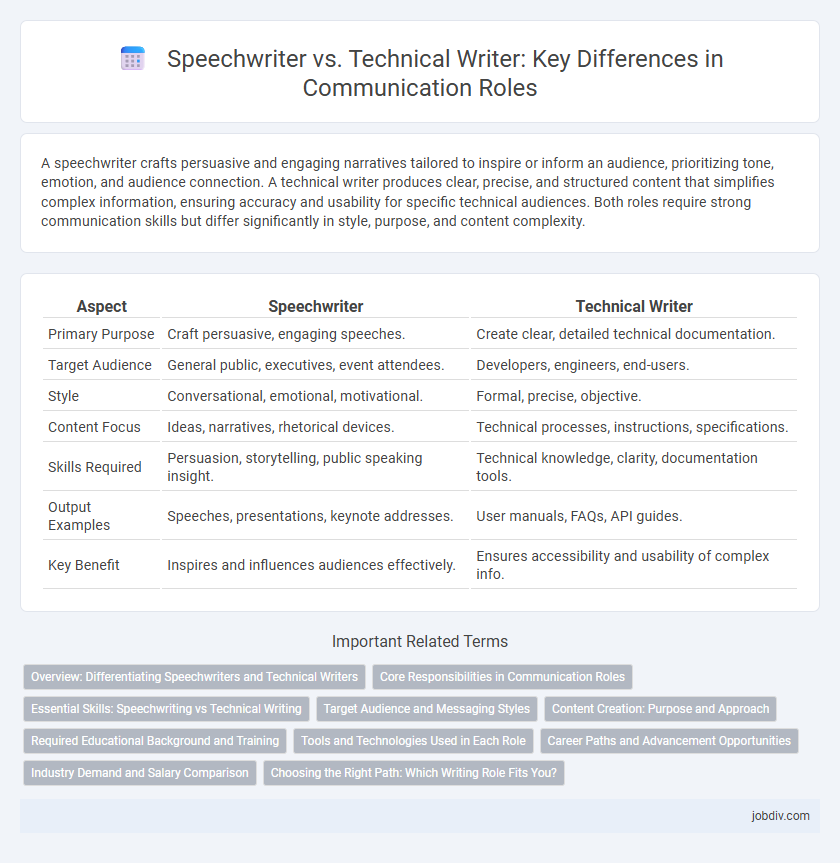A speechwriter crafts persuasive and engaging narratives tailored to inspire or inform an audience, prioritizing tone, emotion, and audience connection. A technical writer produces clear, precise, and structured content that simplifies complex information, ensuring accuracy and usability for specific technical audiences. Both roles require strong communication skills but differ significantly in style, purpose, and content complexity.
Table of Comparison
| Aspect | Speechwriter | Technical Writer |
|---|---|---|
| Primary Purpose | Craft persuasive, engaging speeches. | Create clear, detailed technical documentation. |
| Target Audience | General public, executives, event attendees. | Developers, engineers, end-users. |
| Style | Conversational, emotional, motivational. | Formal, precise, objective. |
| Content Focus | Ideas, narratives, rhetorical devices. | Technical processes, instructions, specifications. |
| Skills Required | Persuasion, storytelling, public speaking insight. | Technical knowledge, clarity, documentation tools. |
| Output Examples | Speeches, presentations, keynote addresses. | User manuals, FAQs, API guides. |
| Key Benefit | Inspires and influences audiences effectively. | Ensures accessibility and usability of complex info. |
Overview: Differentiating Speechwriters and Technical Writers
Speechwriters craft persuasive, audience-focused speeches using rhetoric and storytelling techniques to engage and inspire listeners. Technical writers produce clear, concise documentation such as manuals, guides, and reports to explain complex information accurately. While both roles require strong writing skills, speechwriters emphasize emotional impact and delivery, whereas technical writers prioritize clarity and precision for user comprehension.
Core Responsibilities in Communication Roles
Speechwriters specialize in crafting persuasive and impactful speeches tailored to an audience, focusing on rhetorical techniques and emotional appeal. Technical writers develop clear, concise documentation such as manuals, guides, and reports, prioritizing accuracy and usability for complex information. Both roles demand strong communication skills but target different objectives: speechwriters aim to inspire and influence, while technical writers ensure understanding and clarity.
Essential Skills: Speechwriting vs Technical Writing
Speechwriters excel in persuasive storytelling, emotional appeal, and audience engagement, crafting speeches that resonate and inspire diverse listeners with clarity and charisma. Technical writers specialize in clarity, precision, and analytical skills to produce manuals, guides, and documentation that simplify complex technical information for various user levels. Both roles demand strong language proficiency and adaptability but differ in purpose and tone, with speechwriters prioritizing rhetoric and technical writers emphasizing accuracy and usability.
Target Audience and Messaging Styles
Speechwriters craft persuasive and engaging messages tailored for diverse audiences, emphasizing emotional appeal and clarity to connect with listeners. Technical writers focus on creating precise, concise, and detailed content aimed at specialized audiences requiring clear instructions or explanations. The messaging style of speechwriters is often narrative and motivational, while technical writers prioritize accuracy and usability.
Content Creation: Purpose and Approach
Speechwriters craft persuasive and engaging narratives tailored to specific audiences, emphasizing emotional impact and clarity to inspire action. Technical writers produce precise, detailed documentation aimed at explaining complex information, ensuring usability and accuracy for technical or specialized audiences. The purpose of speechwriting centers on motivating and connecting emotionally, while technical writing focuses on clarity and functional communication.
Required Educational Background and Training
Speechwriters typically possess backgrounds in communications, journalism, or English, often holding degrees in liberal arts or related fields, and benefit from training in rhetoric, public speaking, and persuasive writing. Technical writers usually have education in technical fields such as engineering, computer science, or information technology, combined with specialized training in technical communication, documentation standards, and software tools. Both roles require strong writing proficiency but differ significantly in educational prerequisites and domain-specific training tailored to their distinct communication goals.
Tools and Technologies Used in Each Role
Speechwriters often rely on tools like Microsoft Word and presentation software such as PowerPoint to craft compelling narratives, while leveraging speech analysis tools to fine-tune tone and delivery. Technical writers utilize specialized authoring tools, including MadCap Flare and Adobe FrameMaker, alongside version control systems like Git, to produce precise, structured documentation. Both roles increasingly integrate collaboration platforms like Google Workspace and content management systems to enhance workflow efficiency.
Career Paths and Advancement Opportunities
Speechwriters often advance by gaining visibility through high-profile political or corporate roles, leveraging strong storytelling and persuasive communication skills to influence public perception and policy. Technical writers progress by deepening expertise in specialized industries such as IT, engineering, or healthcare, frequently transitioning into senior documentation roles, project management, or user experience (UX) design. Both career paths offer opportunities for specialization and leadership, but speechwriters typically pursue advancement through networking and reputation in public-facing roles, while technical writers grow through technical proficiency and expanding industry knowledge.
Industry Demand and Salary Comparison
Speechwriters typically see higher demand in political, corporate, and media sectors due to the need for persuasive and impactful messaging, while technical writers are essential across technology, engineering, and healthcare industries for creating clear, detailed documentation. The average salary for speechwriters ranges from $65,000 to $110,000 annually, reflecting the premium on creative communication skills, whereas technical writers earn between $55,000 and $95,000, influenced by their expertise in specialized technical knowledge. Industry growth projections indicate increasing opportunities for technical writers as technology sectors expand, while speechwriter positions remain competitive and often tied to specific organizational needs.
Choosing the Right Path: Which Writing Role Fits You?
Choosing between a speechwriter and a technical writer depends on your strengths and interests in communication. Speechwriters excel in crafting persuasive, engaging narratives tailored for live audiences and public figures, emphasizing rhetoric and emotional appeal. Technical writers specialize in creating clear, precise documentation like manuals and guides, requiring strong analytical skills and the ability to simplify complex information.
Speechwriter vs Technical Writer Infographic

 jobdiv.com
jobdiv.com